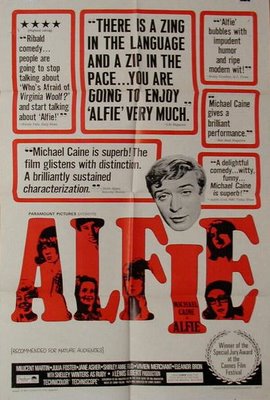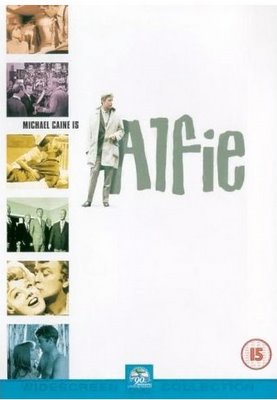
ALFIE (1966)
Cast: Michael Caine (Alfie), Shelley Winters (Ruby), Millicent Martin (Siddie), Julia Foster (Gilda), Jane Asher (Annie), Shirley Anne Field (Carla), Vivien Merchant (Lily), Eleanor Bron (The Doctor), Denholm Elliott (The Abortionist), Alfie Bass (Harry Clamacraft), Graham Stark (Humphrey), Murray Melvin (Nat).
Crew: Lewis Gilbert (director and producer), Bill Naughton (writer), Sonny Rollins (music), Otto Heller (cinematography), Thelma Connell (editor), Peter Mullins (art direction).
Synopsis: Alfie is a man of many lovers, playing the field in swinging 1960s London. His philosophy is have fun and avoid emotional attachment if you want to avoid pain. When standby lover Gilda gives birth to his son, Alfie can’t help enjoying being a father. But he refuses to commit, so Gilda marries another man. Alfie is diagnosed with tuberculosis and spends six months in a sanatorium. After leaving he sleeps with Lily, the wife of another patient. Alfie acquires two lovers – a Northern girl called Annie who cooks and cleans for him and a lively American called Ruby. But he drives Annie away, fearful of commitment. Lily gets pregnant from her fling with Alfie and he procures an illegal abortion for her. Ruby takes a younger lover and casts Alfie aside. He is left on his own, haunted by the consequences of his actions…
Alfie began life as Alfie Elkins and His Little Life, a radio play written by Bill Naughton. It subsequently became a stage play, with Caine auditioning unsuccessfully for the lead. Several years later Lewis Gilbert acquired the film rights. But finding an actor willing to play the lead proved difficult, according to Caine. ‘Everyone who was right for the role turned it down, based on the fact it would ruin them. They wouldn’t play a part where the leading man procured an abortion. I didn’t give a damn about it because I just wanted to do the part.’ Among those who turned down Alfie was Caine’s flatmate at the time, Terence Stamp. Instead he suggested Caine for the role.
On the DVD commentary for The Ipcress File, editor Peter Hunt explains how he helped influence the casting. Gilbert met Hunt during post-production of the first Harry Palmer film and they discussed who would play Alfie. ‘He said he didn’t know. He was very worried about it,’ Hunt recalls. ‘He asked “What’s this boy like that you’re working with, Michael Caine?”’ Hunt gave Gilbert a secret preview of The Ipcress File while it was still being edited. ‘I think the next day he signed up Michael to do Alfie.’
Even when the director was convinced, he still had to sell the actor to Paramount Pictures. ‘The original choice for Alfie was Tony Curtis and he was very hot at the time,’ Gilbert told Films and Filming in 1985. ‘I said it had to be a Cockney and, as it wasn’t a very big budget film, could I have Michael Caine? The reaction then was “Who is Michael Caine?”’ Gilbert eventually got his way and the part went to Caine. Also in the cast was young English actress Jane Asher, then the girlfriend of Paul McCartney. The Beatle visited the set and insisted Asher wear a less revealing shirt during a bedroom scene with Caine.
The film was shot on location around London and at Twickenham Studios for a budget of US$500,000. In the late 1980s Caine gave a televised masterclass in film acting. In the published transcript, Caine revealed he had based his performance as Alfie on a friend called Jim Slater, who was very successful with women. ‘In Alfie my character spoke to the audience through the camera, a bit like the technique of “asides” in the theatre. I used Jim as the person to whom I was talking. When I first spoke directly to the camera, I treated it like a large audience.’ Gilbert directed Caine to perform the speeches as if to a single person. ‘I played the moment as though I were talking to Jim. He would have especially appreciated remarks like “She’s in beautiful condition” when Alfie was running his hands over a woman’s bum, because Jim used to say things like that. That confidence in Jim’s appreciation is what won me the collusion of the cinema audience, even when they didn’t really approve of Alfie’s goings-on.’
Gilbert told Film Review that Alfie was an audience participation movie. ‘In many of the key scenes Alfie turns to the audience and talks quite frankly and intimately to them. They must respond. In fact the success of the film will depend largely on the viewer going along with Alfie and feeling to be part of his life.’
Alfie was presented to the British Board of Film Censors (BBFC) in January 1966, which passed the picture uncut with an X Certificate. At the time that excluded children under the age of 16. The most contentious part of the movie was the abortion, with Gilbert battling US distributor Paramount to keep it in. The director had already trimmed the sequence after five secretaries fainted at a preview screening. Eventually the studio relented, although the scene was subsequently deleted in some countries.
Alfie was a box office smash in Britain and earned Merchant a BAFTA award as most promising newcomer, along with nominations for best British film, actor (Caine), screenplay, editing and cinematography. The theme song to Alfie by Hal David and Burt Bacharach was sung for the screen by Cher but became a British Top 10 hit for Cilla Black. In France it received a special jury prize at the Cannes Film Festival and was nominated for the Golden Palm. Despite this success, Caine felt sure his accent and the film’s subject matter would prevent it doing well in America. Paramount had him loop more than a hundred lines of dialogue, softening his accent and changing words like ‘fag’ to ‘smoke’ to avoid confusion.
Alfie opened in the US during August 1966 and became a huge hit, reportedly grossing about $15 million and introducing Caine to American audiences. The movie was nominated for five Oscars – best picture, actor (Caine lost to another British actor, Paul Scofield, in A Man for all Seasons), supporting actress (Merchant), adapted screenplay and song. Caine was also nominated for a Golden Globe as best actor in a drama film and won the best actor award from America’s National Society of Film Critics.
In interviews Caine has listed Alfie among his favourite roles, because it took his name around the world. ‘That film struck a chord,’ he told Loaded in 1999, ‘because men all over the world would watch it and think they could pull all the birds, just like Alfie. People would assume I was just like the character. But I wasn’t really.’
In 1975 a less successful sequel called Alfie Darling was released. Alan Price replaced Caine in the lead role with Ken Hughes taking over as director. In 1996 pop group Divine Comedy had a Top 30 hit in Britain with the single ‘Becoming More Like Alfie’. The film Austin Powers in Goldmember (2002) initially featured a new version of the Alfie theme song but that was cut after poor reactions at test screenings. The sequence can be seen on the DVD release and includes footage from Alfie. In September 1999 the British Film Institute (BFI) took a poll of 1000 people within the industry to find the Top 100 British movies of the twentieth century. Alfie was the third highest place of seven Caine pictures on the list, being voted 33rd best film.
In 2002 Alfie was among several Caine films mooted for a remake. Actors Ewan McGregor and Brad Pitt were both tipped to play the lead. Caine described the idea as flattering. ‘We can’t have done a bad job of it the first time if they want to remake them now.’ In April 2003 Variety reported that Paramount was negotiating with Jude Law to star in the remake, directed by Charles Shyer with a script by Shyer and Elaine Pope.
 First available on video in Britain during 1985, Alfie was reclassified as a 15. It was digitally re-mastered and issued on VHS and DVD in 2002.
First available on video in Britain during 1985, Alfie was reclassified as a 15. It was digitally re-mastered and issued on VHS and DVD in 2002. Reviews: ‘Alfie pulls few punches … behind its alley-cat philosophy, there’s some shrewd sense, some pointed barbs and a sharp moral.’ - Variety
‘Michael Caine … tends to be monotonous. Both he and director Gilbert seem as little conscious of the character’s psychological undertones as Alfie himself.’ - Monthly Film Bulletin
Verdict: Nearly forty years after it was made, Alfie now looks like a period piece from an era before the Pill or AIDS – at least on the surface. Despite this, Alfie remains fresh and enjoyable. The balance of power has shifted in the battle of the sexes since the mid-1960s, but this film still has much to say about the way men and women interact. Caine gives a bravura performance, all the more remarkable for being only his second leading role. He makes Alfie completely likeable, despite the way the Cockney Casanova uses everyone around him. The device of having a character talk directly to the audience is over-familiar these days from its frequent use on television sitcoms, but here it is compelling, drawing you into Alfie’s mindset. Caine’s finest moment is the quiet horror he displays when looking down at the aborted foetus that would have been his child. Gilbert directs Naughton’s funny, poignant script with a light touch, aided by Heller’s rich cinematography. Alfie is a restrained, thoughtful film and well worth seeing.
No comments:
Post a Comment